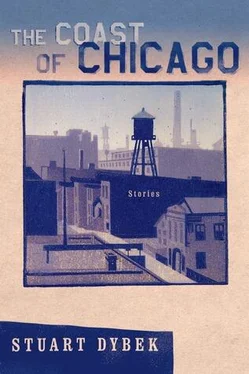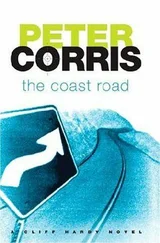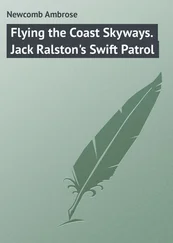The guy with his back to the window has been sitting there a long time nursing his mug of java. Ray, stooping to rinse out a cup, avoids looking in his direction. There’s something about the way the guy’s hat shadows his face, about his shoulders, hunched as if braced for another blow, about his eyes plumbing the depths of his coffee, that discourages conversation. It would be like trying to make small talk with a hit man. Besides, the guy has been mumbling to himself, his mouth moving as if chewing something too bitter to swallow. If he’s thinking about women, he must be counting up all the times they’ve cheated on him. If he’s thinking about work, he’s adding up the brutal ways of saying they’re taking your job: fired, canned, sacked, axed, terminated . He’s dwelling on the lost in “lost his job” —lost— as if the eight hours of sweat at the heart of each day could be misplaced. Why call it lost if it’s been taken from you? Lost is a lie, and without such lies the streets would be crowded with assassins. But his incessant tallies, his lists of lies and grievances, his roll call of betrayals, have added up to nothing but insomnia. Insomnia is a private score he has, so far, settled only with himself; it’s the time he does each night for his own betrayals, his own petty offenses of failure, hard luck, desperation. And insomnia is also the threat of unnamed crimes still more menacing. After dark, he carries it beside his heart, concealed like a weapon.
And finally, what about the empty water glass set on the counter before an empty stool? No tip beside it. Not that anyone but Ray paid any attention to the person who sat there and ordered merely water. Only Ray recognized immediately that a sleepwalker had entered the diner. They wander in occasionally, and Ray has learned to recognize their habits — how they order nothing but water, and never tip. At first, Ray would serve them only what they asked for, but now sometimes he buys them a coffee on the house. He isn’t sure himself whether he does it out of kindness or cruelty. He’d like to think it’s kindness, that if it were he who was wandering the streets asleep, he’d be grateful to anyone who tried to help. But Ray’s not certain. He’s heard it can be dangerous to tamper with sleepwalkers, that their souls can leave their bodies, and so Ray always braces for that moment when the steaming coffee first touches their lips and they wake.
The sleepwalker’s eyes roll open. He glances around wildly as if he doesn’t realize what’s happened or even that he is awake. Fluorescence scalds his pupils as the coffee did his lips. The diner seems frozen in the blinding pop of a flashbulb that refuses to fade — a glare as stark as the illumination of certain dreams, brighter for being framed by night. In that paralyzing light, the sleepwalker sees the lovers at the other end of the counter, with their bleached-out, hawk-featured faces staring straight ahead as if they’re in a trance; and Ray, glancing away, caught in the act of dunking a cup under the counter as if disposing of evidence; and the hit man in the shadowy hat, mumbling to no one. Stunned as he is, the sleepwalker can feel the paralysis of the diner drawing him in as if he belongs there too. With a half spin, he shoves away from the counter, rises from his stool, and, leaving no tip, staggers for the door. And as he pushes out, something snaps him fully awake — maybe the night air, or the slap of a patty hitting the grill, or his soul returning to him from shadows. He stands outside the diner, within the perimeter of its aura, and stares down a street of dark windows, wondering which way he’s come from, which way to go. In the diner’s almost phosphorescent glow, the deserted street looks like pavement might on the moon. Above the roofs, he can see the moon the lovers at the end of the counter left behind, no longer newly minted, surrounded by the same aura as the diner, waiting faithfully like a dog for them to reemerge. In their absence, it’s gone through phases, diminishing like a stalled traffic light in the rearview mirror of a taxi. Now it’s less than a crescent, less than a smudged thumbprint of mother-of-pearl — only a shimmer like the glint of neon on the surface of a cup of black coffee. The bitter taste of coffee still burns his tongue. He can feel his nerves jumping and his heart starting to race as if that mere sip in the diner has stoked him with the stamina of caffeine, and converted him from sleepwalking to insomnia. From somewhere in the sky above the diner, he hears the screech of a single nighthawk, and suddenly he’s happy. It seems to him enough to simply be awake like that bird soaring in the darkness that sleepers have abandoned, to be walking away from the lighted corner, down the empty, silent streets they’ve left to him, whistling as he passes dark windows, not sure where he’s going, and in no hurry to find out. It’s the middle of the night, and tomorrow seems as if it’s still 93 million miles away$$$$.
They wake simultaneously in a hotel room on the thirty-seventh floor, neither of them sure of the time, both still a little drunk, a little numb from the silence that has grown between them.
“Look at the sky! Look at the light!” she exclaims.
He’s already seen it — how could he not? The enormous bed faces a wall of windows. They’ve left the drapes open. The wall of windows now seems like a wall of sky, almost indigo, shot with iridescence as if veins of a newly discovered precious mineral have been exposed. It isn’t dawn yet. It’s still a gradation of night, but night with tomorrow already luminous behind it like the silver behind the glass of a cobalt mirror.
He can see the sky reflected in the windows of all the surrounding buildings that tower up to form the glass cliffs of the gold coast they’ve drifted to. He knows that every city has such strips, and he distrusts them. No matter how authentically elegant they might appear, he thinks of them as illusory, removed from the real life of cities, as places that are really no place, reflections floating like illuminated scum on the surface of a river. He remembers how, as teenagers, he and a buddy spent their nights exploring the gold coast in the city they’d grown up in, and the mixture of awe and contempt they’d felt toward it.
He no longer feels superior to gold coasts. He wonders how many of his fellow sleepers are sitting up as he is, silently peering out of highrise rooms in which the drapes have been drawn open on tremendous windows, windows for giants, scaled to encompass the winking horizon of the city. He both envies those still sleeping peacefully and pities them for missing this nameless, early sky which he knows already will be more unforgettable than any dawn he’s ever seen. He wonders which of those two emotions the future will reveal as the more accurate. Once, shortly after they’d become lovers, she told him, “I’m not sure if meeting you has been the most lucky or unlucky thing that’s ever happened to me.”
He had laughed.
“I wasn’t kidding,” she said.
“I know,” he said. “I’m only laughing because that’s exactly what I was thinking about meeting you.”
“See. Maybe that’s what happens when it’s fate. One always feels what the other is feeling, at the same time, together.” She laughed too.
“Kind of emotional telepathy, eh?”
“‘Emotional’ makes it sound too glandular ,” she said, rolling her eyes, speaking in the teasing way she had that made for private jokes between them. “I’m not talking about something in the glands ; I’m talking about something in the stars.”
Now, beside him in bed, she whispers, “Why did we have to see this together?” It isn’t said cruelly. He understands what she means. She means they’ve seen this unsuspected sky only because of each other; that it’s something more between them to remember. And he knows that he doesn’t need to answer, that it’s as if he’s merely overheard her speaking to herself, almost as if he isn’t there any longer, as if she’s awakened alone, at an unknown hour, along a gold coast.
Читать дальше












